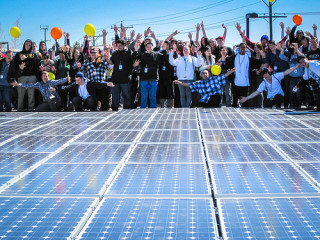When President Obama unveils his climate policy proposal in the coming days, he should focus on the one key element of successful climate and energy policy. It’s not about utilities or incentives or numbers, it’s about ownership.
Climate-protecting energy policy succeeds when communities can keep their energy dollars local by directly owning and profiting from investments in renewable energy.
Look at Denmark, with wind power capacity sufficient for 28% of its electricity use. When the world’s nations descended on Copenhagen in 2009 for the climate conference, attendees could have gleaned their most important lesson by gazing across the water at the Middelgrunden offshore wind farm – 50% owned by over 10,000 Copenhagen residents. Local ownership like this was the centerpiece of building over 4,000 megawatts of wind power in Denmark, increasing energy independence by letting ordinary citizens collectively own wind farms that brought money right back into their community. Ownership let Danes focus on their own energy independence and economy. Concern for the climate was secondary.
Andrew Cumbers of the UN Research Institute for Social Development explains the ongoing strength of the Danish commitment to renewable energy:
The participation of communities in the ownership and development of the technology has been a critical factor in the successful growth of renewable energy capacity. Surveys suggest around 70 per cent of the population are in favour of wind farms with only around 5 per cent against (Soerensen et al 2003), figures that are far higher than found elsewhere. (emphasis added)
Germany’s roaring success reinforces why ownership should be President Obama’s highest priority. Over 60% of mid-day electricity demand was met with wind and solar on a recent sunny day, and almost 25% of annual German electricity usage comes from renewable sources. Once again, it’s a people-powered transition (or as the Germans like to call it, Energiewende, or “energy change”).
Nearly half of all German renewable energy capacity is owned by individuals, not utilities. These small, quickly built distributed energy projects multiplied quickly under simply policies that made it easy for Germans to own a share in their energy future.
Despite numerous attempts by various political factions to curtail the renewable energy transition (most frequently citing high costs), Germans remain stolidly committed to growing renewable energy, with over 60% willing to pay more to continue its expansion. A survey of Germans towns suggest that ownership, more than anything else, has built this steadfast political support for a low carbon energy future.
Evidence that ownership holds the key to political success lies closer to home, as well. After a near-death experience at the polls, Ontario’s Liberal Party revised their renewable energy program to prioritize new wind and solar projects that sport local ownership and public support. Most U.S. state renewable portfolio standards include language that requires or prefers qualifying projects to be in state,* to link the economic and environmental outcomes. These statutes have survived an all-out assault by the corporate-funded conservative lobbying group ALEC. And one should not ignore the power of having the Atlanta Tea Party testifying alongside solar power advocates against monopoly utility Georgia Power, arguing that more people should be able to generate their own energy.
Ownership is good politics not just because of who wins, but how much they win. A study from the National Renewable Energy Laboratory shows local ownership dramatically multiplies the economic returns of renewable energy for the host community.
No climate proposal from President Obama will sail past Republican opposition (see: Waxman-Markey), but his greatest chance for a climate legacy lies in empowering Americans to take control – with their votes and their dollars – of their own energy future.
Photo credit: Black Rock Solar
*Note: a recent court decision struck down this provision in Michigan, jeopardizing the in-state preference for all states that include this policy.




